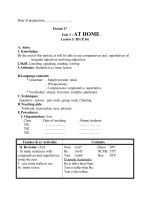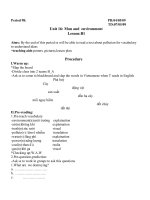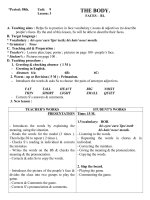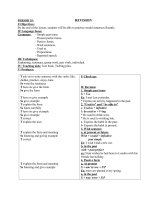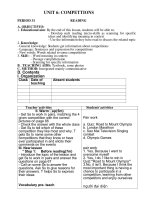anh 6unit 5
Bạn đang xem bản rút gọn của tài liệu. Xem và tải ngay bản đầy đủ của tài liệu tại đây (180.99 KB, 20 trang )
<span class='text_page_counter'>(1)</span>UNIT 5: THINGS I DO 1. 2. 3. 4. 6. 7. Date: October Period: 26th. Division of lessons: Lesson 1: A (1 – 2) (26) Lesson 2: A (3 – 4) (27) Lesson 3: A (5 – 6) (28) Lesson 4: B (1 – 3) (29) 5. Lesson 5: C (1) (30) Lesson 6: C (2 – 3) (31) Lesson 7: Grammar practice (32) _____ *(* ____ *)* _____*(*_____. th. , 2008 UNIT 5: THINGS I DO Lesson 1: A (1 – 2). I. Aims: By the end of the lesson, students will be able to use Simple Present tense with I and he / she to talk about daily routines. II. Language contents: 1. Grammar: What + do / does + S + do [every morning / day…]? S + V (-s / -es) … [ every morning / day …] 2. Vocabulary: do, play, homework, games III. Techniques: Asking and answering, Slap the board, Comprehension Questions, Write It Up, pair work, group work IV. Teaching aids: tape V. Procedures: Teacher’s and students’ activities -T asks Ss : - Students answer and get marks.. - Then T presents new words and give game - Students copy, give the meaning. Contents 1. Warm up: What do you do every morning? I get up, get dressed, brush my face, have breakfast, go to school. 2. Presetation * Slap the board:.
<span class='text_page_counter'>(2)</span> and play game. play games. have breakfast. do your homework Get dressed. Go to school. Pre teach vocabualry: (to) do your homework (to) play games Presentation Text: - Make sure that student have a clear A1 page 52 Model sentences: understanding of teaching points Every day I go to school given. she goes Comprehension Questions: A2. page 53 a) – d) 3. Practice A1. Listen and repeat. Then practice with a partner. (page 52) - Play the tape twice. Substitution Drill: - Students listen and repeat. - Ask students to practice with their T: Every day I get up at 6. Students: Every day Nga gets up at sixs. partner. T: I brush my teeth. - Students practice in pairs. Students: She brushes her teeth. - Call some pair of student to Etc. practice in front of the class. A2. Look at the exercise A1. Ask and answer with a partner. (page 53) Comprehension questions: a) Every day, Nga gets up at six. - Have students answer the b) Every morning, she goes to school. questions. c) Every afternoon, she plays games. - Students work in pairs. d) Every evening, she does her - Call some pairs of students to homework. practice asking and answering the 4.Production: questions. Write It Up: Every morning, Nam gets up at five thirty. He has breakfast , He goes to school, …. 5.Homework: - Let students write about their Learn by heart new words and model partner’s routines. sentences. - Correct if necessary. Prepare Unit 4: lesson 2: A (3 – 4) page.
<span class='text_page_counter'>(3)</span> - Ss should remember. 53 – 54.. Comment: -------------------------------------------------------------------------------------------------------------------------------------------------------------------------------------------------------------------------------------------------------------------------------------------------------------------------------------------------------------------------------------------------------------------------------------------------------------------------------------------------------------------------------------------------------------------------------------------------------------------------------. Date: ………………….......Unit 5: THINGS I DO Period:27. Lesson2 : A3 + A4. I. Aim: By the end of the lesson, Ss will be able to describe routines after school. II. Language contents: 1. Grammar: What do you/ they do after school ? does she/ he 2. New words: watch after housework listen to music read television. III. Techniques: Ask and answer, matching IV. Teaching aids: tape. V. Procedures: Teacher’s and Ss’ activities -T asks -Ss answer and get marks. Content 1. Warm up: 1.What do you do everyday? 2.What do you do every afternoon? 3.What do you do every evening?.
<span class='text_page_counter'>(4)</span> T says:. (Ss’answer) What do you do after school?. 2. Presentation: A3. Listen and repeat. Then practice -Ss answer by Vietnamese the dialogue with a partner -T writes English New words: -Ss copy down -to watch television. -Ss repeat after her -to do housework. (chorally,individually). -a housework (n). -to listen to (v). -Ss listen to the tape three times to know -the music (n). Ba, Nam, Lan, Thu. What do they do -to read : after school?(book close) Model sentence: -T explains model sentence What do/ does ….. do after school? -S listen to and take note 3. Practice: -Ss practice A3(p.53)in pair A3/ P.53 -Some pair take the rolls in front of class -Ss ask and answer (work in pair). A4. Answer. Then write the answers in your exercise book -Ss write the answer in their notebook a) Lan does the housework. b) Ba watches television. c) Thu reads. d) Nam listens to music. -T requires them to interview some friends and telling about their everyday activities. 4.Production:: -Ss play “Matching”. brush soccer my face games television up homework teeth listen to watch get play music Ss should remember. 5. Homework: -Learn by heart new words and.
<span class='text_page_counter'>(5)</span> structures. --Prepare:Unit 5: Lesson 3: A5, A6. Comments : ---------------------------------------------------------------------------------------------------------------------------------------------------------------------------------------------------------------------------------------------------------------------------------------------------------------------------------------------------------------------. Week: 10 Period:28 Date: 15/10/2012. Unit 5: THINGS I DO. Lesson3 : B1,2. I. Aim: By the end of the lesson, Ss will be able to read and understand about Ba’s routine. II. Language contents: 1. Grammar: What time does Ba get up? ? He gets up at six. Does he go to school at seven? -Yes, he does / No, he doesn’t. 2. New words: Take a shower, eat, have lunch, go home, go to bed, start, finish. III. Techniques: Matching, guessing, mindmap IV. Teaching aids: Pictures of Ba’s routine..
<span class='text_page_counter'>(6)</span> VI. Procedures: Slide 1: Greetings Slide 2: Play game “crossword” Slide 3: mindmap of my day Slide 4: Introduce the new lesson. Slide 5,6,7,8,9,10,11: Introduce the new words. Slide 12: Check the new words. Slide 13: Present the model sentences. Slide 14: Guessing T/F. Slide 15: Work in groups, find the time of Ba’s activities. Slide 16: game “lucky numbers. Slide 17: mindmap of Ba’s routine. Slide 18: Homework. Slide 19: say goodbye.. Teacher’s and Ss activities -T play “Matching”.. Content 1. Warm up: *Marks Watch homework Play games Get up Do one’s face Listen to breakfast Go to housework Brush television Wash music Have school Do one’s teeth 2. Presentation: A5. Listen and repeat. Then practice.
<span class='text_page_counter'>(7)</span> Do. you. Does Yes,. she. watch TV play games play football. after school ?. I she. do does. I she. with a partner T asks Ss “What do you do after I play games. school ?”. I watch television. -Ss answer. New words: -T shows pictures a bout sport to present -volleyball (n) new words -soccer (n) -Ss look at pictures and give meaning, -girl # boy (n): copy -Ss read (chorally).. /No. don’t doesn’t. -Ss listen to the tape and repeat. -Calls them to work in pairs in front of the class. -Explains Yes/ No questions. . -Ss listen to A6/ page 55 and answer. -T asks some Ss -Ss answer -Gives exercises. -Ss do.. -Ss should remember. .Practice A6. Listen and answer. Say Yes, I do or No, I don’t 1) Ba watches TV 3) Girls listen to music 2) They play soccer *Do you play …..? 4.Production: Choose the best correct 1) Do you play games ? No, I (do/ don’t). 2) Tuan and Hung (listen/ listen to ) music after school. 3) He (don’t/ doesn’t) have a big breakfast every morning. 4) (Do/ does) your father read newspaper before breakfast ? 5. Homeworks: -Learn by heart new words and structures. -Prepare: Unit 5 Lesson 4. B1, B2, B3.. Comments : ---------------------------------------------------------------------------------------------------------------------------------------------------------------------------------------------------------------------------------------------------------------------------------------------------------------------------------------------------------------------.
<span class='text_page_counter'>(8)</span> ---------------------------------------------------------------------------------------------------------------------------------------------------------------------------------------------------------------------------------------------------------------------------------------------------------------------------------------------------------------------. Week:10 Period:29 Date: 17/10/2012 UNIT 5: THINGS I DO Lesson 4: B (3 – 4) I. Aims: By the end of the lesson, students will be able to practice asking and answering about Ba’s routine, then they practice about them. II. Language contents: 1. Grammar: The Present Simple Tense What time do you get up? I get up at 6. 2. Vocabulary:.
<span class='text_page_counter'>(9)</span> Review: Take a shower, eat, start, finish, have lunch, go to bed III. Techniques: Jumble Words, pair work, group work IV. Teaching aids: -Pictures about Ba’s routine. V. Procedures: Teacher’s and Sts’ activites - Have students play Jumbled Words. - What do you do every morning/ afternoon/ evening? - Students can get marks.. - Ask students to review these words. - What does Ba do every morning? - He takes a shower. - What does he do every afternoon? - He has lunch. - What does he do every evening? - Today we are going to learn more about Ba’s routine.. Contents 1. Warm up:/Marks Jumbled Words: tae (= eat) chuln (= lunch) take a whosre (= take a shower) go to deb (= go to bed) rstat( = start) hifsni(= finish) 2. Presentation: Review: (to) take a shower (to) eat (to) start (to) finish (to) have lunch (to) go to bed. -T reviews the model sentences. -T asks a student.. Structures: What time do you go to school? I go to school at 12.15. -Then have sts look at the time of Ba’s What time does Ba get up? activities and answer the question He gets up at 6. 3. Practice: - Have students look at the times in the table about Ba’s routine. -Then ask students to complete the “me” column in the table. Action Get up Go to school Classes start Classes finish Have lunch. Time Ba 6.00 6.45 7.00 11.15 11.30. Me.
<span class='text_page_counter'>(10)</span> - Then have sts ask and answer about the time of Ba’s routine -Students practice in pairs. -Call sts to ask and answer in front of the class. -Correct. -Then sts practice about them. -Have sts write the time given in words. -T corrects and give the correct answers. T can give marks -Then ask sts to do exercise about the verb form. -Correct and give the correct answers. -T explains the homework.. Go home 5.00 Go to bed 10.00 Example Exchange: a) S1: What time does Ba get up? S2: He gets up at six. Ect. b) S1: What time do you get up? S2: I get up at 5.30. Etc. 4. Production: 1. What time is it? a. 6.15:It’s six fifteen b. 8.30: It’s hafl past eight. c. 9.50: It’s nine fifty. d. 11.15: It’s a quarter past eleven. 2. Give the correct form of the verbs in brackets: a. I (get) up at six every morning. b. She (have ) lunch at eleven fifteen. c. They (go) to school every morning. d. Does Ba (take) a shower every morning? * Answers: a.get b. has c. go d. take 5.Homework: Learn by heart new words and structures. Write 5 sentences about your routine. Ex: Hi, I’m …….I get up at 6…….. Prepare Lesson 5: C (1) +Find the new words. +Write your timetable.. Comments: …………………………………………………………………………………… …………………………………………………………………………………… …………………………………………………………………………………… …………………………………………………………………………………… …………………………………………………………………………………….
<span class='text_page_counter'>(11)</span> Week:10 Period: 30 Date: 20/10/2012 UNIT 5: THINGS I DO Lesson 4: C1 I. Aims: By the end of the lesson, students will be able to talk about the school timetable with school subjects vocabularies. II. Language contents: 1. Grammar: What do we have today? We have [English]. 2. Vocabulary: A timetable, English, math, literature, history, geography, Monday III. Techniques: Crosswords, what and where, lucky numbers IV. Teaching aids: Pictures about the subjects V. Procedures:.
<span class='text_page_counter'>(12)</span> Teacher’s and students’ activities - Let students play Word square. - Students play in groups. - Students can get marks.. Contents. 1. Warm up: Word square: H O M E W O R K S L I S T E N T T D O P L A Y A A G W O R K O K R O N R E A D E T W A T C H T E T M U S I C V A T F I N I S H T start, to, old, go, sports, TV, take, eat homework, listen, do, play, work, OK, read, watch, at, music, finish How many subjects do we have today? 2. Presentation: New words: (Ordering vocabulary) Ss answer (by Vietnamese) and how English – 3 do we call in English Math – 4 T presents new words with real objects Literature – 1 -Ss repeat, give meaning and copy History – 5 -Ss repeat many times Geography – 2 Ss play game with objects above Monday – 6 - Then Play the cassette twice. * Guessing game: - Have students listen and repeat. Presentation Text: - Ask students to practice as model C1. page 58 sentences. Model sentences: - Students work in pairs. What do we have today? (?) We have English. (+) I don’t have my timetable. (-) 3. Practice: C1. Listen and repeat. (page 58) Word Cue Drill:.
<span class='text_page_counter'>(13)</span> English / 1.30. - Let students practice asking and answering about the table. - Students practice in pairs. -T calls some pair to practice in front of class -take the rolls. Ss do it in pair and get marks. - Ss should remember. History / 2.35 Math / 1.00. Literature / 3.20. Geography / 4.15. Example Exchange: S1: What do we have today? S2: We have [ English]. S1: What time does it start? S2: [ one thirty.] 4. Production: Mapped Dialogue: What … today? History What time … start? 2.35 Do we … literature Yes …3.20 What time .. finish? 4.05 What … at 4.15? Geography Do we … math? Yes Example Exchange: S1: What do we have today? S2: We have History. S1: What time does it start? S2: at 2.35. S1: Do we have literature at 3.20? S2: Yes. S1: What time does it finish? S2: 4.05 Etc. 5. Homework: Learn by heart new words and model sentences. Prepare Unit 5: Lesson 6: C (2 – 3) page 59.. * Remarks: ………………………………………………………………………………………… .. …………………………………………………………………………………… ……………… …………………………………………………………………………………… …………….
<span class='text_page_counter'>(14)</span> …………………………………………………………………………………… …………… …………………………………………………………………………………… ………………. Week: 11 Period: 31 Date: 22/10/2012 UNIT 5: THINGS I DO Lesson 6: C (2 – 3) I. Aim:.
<span class='text_page_counter'>(15)</span> By the end of the lesson, students will be able to use days of the week vocabularies and they can talk about the weekly timetable. II. Language contents: 1. Grammar: When do we have English? We have it on Monday, Wednesday and Saturday Which classes do you have on Monday? I have english, math and music on Monday 2. Vocabulary: Monday, Tuesday, Wednesday, Thursday, Friday, Saturday, Sunday III. Techniques: Brainstorming, Matching, Predict Dialogue, Board Drill, Example Exchange IV. Teaching aids: Calendar, tape V. Procedures: Teacher’s and students’ activities - Have sts play brainstorming. - Ask sts to write the subjects they have learnt.. Contents 1. Warm up: Brainstorming: math history Music English. subjects. geography T introduces the newlesson: “Today Literature we are going to study about the subjects we have every day in a 2. Presentation: week.” New words: (Pre teach) -T presents the new words by using Monday, Tuesday, Wednesday, Thursday, the calendar. Friday, Saturday, Sunday -Today is Monday. -And today is Tuesday. …. -Guide sts to read the new words. -Ask sts to read the new words chorolly and individually. Matching -T checks the new words by matching Monday Thứ bảy the words with their meanings. Tuesday Thứ năm.
<span class='text_page_counter'>(16)</span> -T presents the model sentences. Have sts remember their timetable and answer the questions. -“Today is Monday. What do we have today” -I enlarges the model sentences. -Guide sts to read the model sentences. -Ask students to complete the dialogue by guessing. - Students guess and fill in the blanks in the dialogue. - Let students listen to the cassette and check their answers.. - Have sts read the dialogue again and answer the questions. - Sts work in groups - Call sts to give their answers. - Correct and give the correct answers. Wednesday Thứ ba Thursday Chủ nhật Friday Thứ sáu Saturday Thứ tư Sunday Thứ hai Model sentences: What do we have today? -We have english, math and technology. When do we have math? -We have it on Monday, Wednesday and Friday. -Which classes do we have on Monday? We have Math, literature and music on Monday. Predict Dialogue: key: Nga: When do we have …? Answer C3 p.59 Ba: We have it on … and … Nga: When do we have …? Ba: We have it on … Nga: Does Lan have math on …? Ba: … 3. Practice: Read the dialogue and answer the questions: a. When does Ba have history? b. When does Ba have Math? c. Does Lan have Math on Friday?. 4. Production: - Ask students to practice with their timetable. - Students practice in pairs. - Call on some pairs of students to practice in front of the class. - Students can get marks.. Board Drill: Thứ Thứ3 Thứ Thứ5 Thứ6 Thứ7 2 4 Toán Văn Sinh Anh Văn Công nghệ Toán Văn Toán TD Sử Lý Sử Anh Lý TD MT Văn Gdcd Anh Địa Nhạc Văn Chaò SHCN cờ.
<span class='text_page_counter'>(17)</span> - Ss should remember. Example Exchange: S1: When do we have math? S2: We have it on Monday, Wednesday and Saturday. 5.Homework: - Learn by heart the new words and model sentences. - Write your timetable in English. - Prepare Grammar Practice page 60 – 61. - Review how to say the time / simple present tense / question words / yes/no question - Do exercises in text book. * Comments: ……………………………………………………………………………………….. …………………………………………………………………………………… ……………… …………………………………………………………………………………… …………… …………………………………………………………………………………… ……………… …………………………………………………………………………………… ………………. Week: 11 Period: 32 Date: 24/10/2012. GRAMMAR PRACTICE. I. Aims: By the end of the lesson, students will be able to further practice in Simple Present tense, Telling the Time, Adjective with “Be”, Question Words, School Subjects and Days of the Week. II. Language contents:.
<span class='text_page_counter'>(18)</span> 1. Grammar: The Present Simple Tense Question Words Be + Adjectives What time …? 2. Vocabulary: Review vocabularies in the previous lessons. III. Techniques: pair work IV. Teaching aids: A clock,cards 1. Warm up: T shows a clock and asks Ss about the What time is it? time -It’s….. -Ss answer 2. Presentation: -Today we are going to review how to * What time is it? say the time. -7.00: It’s seven o’clock -T reviews by asking sts to answer about -7.15: It’s seven fifteen / It’s fifteen past the time given. seven. -7.30: It’s seven thirty / It’s half past seven -T reminds the simple present tense *Simple present tense: Ss take note. I/you/we/they…+ go,get,…. Afirmative: He/she/ it/Lan/…+goes,gets…. -T gives example -Ss observe and copy. Ex: I watch television He watches television Negative: I/you/we/they…+do not +go,get,… He/she/ it/Lan/..+does not+goes,gets…. : I do not watch television He does not watch television Inter : Do + /you/we/they…+go,get,…? Does + He/she/ it/Lan/…+goes,gets…? Agree:yes,I/they/we/he…do/does Disagree:No, I/we/they/he/she..do/does not. Ex: Do you watch television? Yes,I do Does He watch television? Yes, He does.
<span class='text_page_counter'>(19)</span> *Note: The letter end of verb is (ch, sh, o, s,x) we add “es”.Other “s” - Make students know how to do the exercises in their books. - Ss do individually and get marks -T calls some Ss give the answer on the board -Have sts ask and answer about the time in pairs. -Call sts to give their answers -Correct -Have sts answer about their house and school by Yes or No. -Have sts complete the sentences, using question words. -T corrects -Have sts answer about them. -Have sts complete the sentences with the correct verb form. -Have sts answer about them. 3.Practice: Exercise 1. a. get, get, get, gets, get, get b. do/have, have, does/have, has, do/have, have c. do/go, go, do/go, go, does/go, goes d. do/wash, wash, does/wash, washes 2. a. It’s seven o’clock b. It’s nine fifteen c. It’s four thirty. d. It’s twelve o’clock. e. It’s one forty-five f. It’s eight fifty. 3. a. No, it isn’t b. Yes, it is 4. a. where b. how c. what d. how e. which f. which 5. a. I have it on…. b. I have it on…. c. I have it on….. d. I have…….on Friday e. I have…….on Monday 6. Sts’ answers 7. a. gets b. takes c. brushes d. has e. goes 4.Production: * Answer about you: 1.What’s your name? 2.How do you spell your name? 3.Which grade are you in ? 4. How many students are there in your class? 5. Where do you live ? 6. When do you have math?.
<span class='text_page_counter'>(20)</span> -Ss should remember. 5.Homework: Learn by heart the Present Simple Tense. Do these exercises again. Prepre Unit 6: A1,2 - Find the new words about some places. -Read the text about Thuy -Review: “What is that? / what are those?”. * Comments: ………………………………………………………………………………………… .. …………………………………………………………………………………… …………… …………………………………………………………………………………… …………… …………………………………………………………………………………… …………… …………………………………………………………………………………… ……………….
<span class='text_page_counter'>(21)</span>
